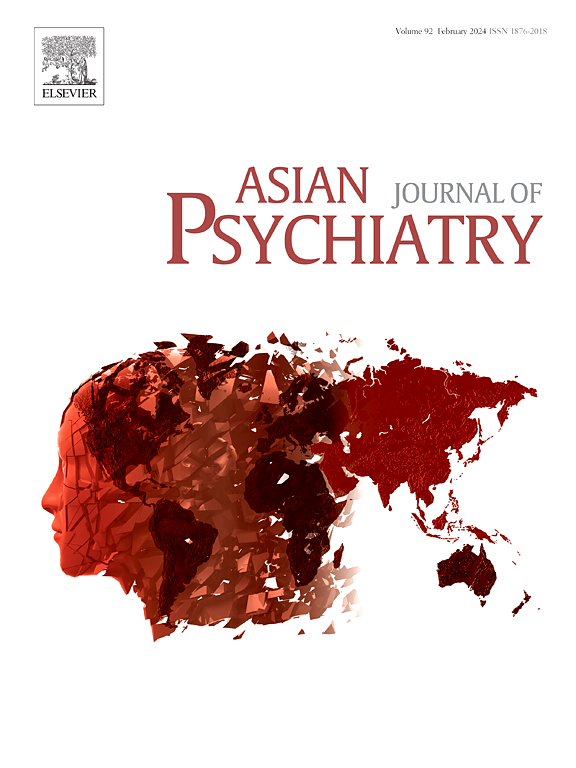Perspectives on psychotherapy in Southeast Asia: Insights from psychiatrists and trainees (Part I: Attitudes, current practices and training preferences)
IF 4.5
4区 医学
Q1 PSYCHIATRY
引用次数: 0
Abstract
Introduction
Psychotherapy is an evidence-based treatment for mental disorders. Despite its global development, neuroscientific advances, and measurable efficacy, attitudes toward psychotherapy in Southeast Asia (SEA) remain underexplored, particularly among psychiatrists and psychiatric trainees.
Objectives
This study aimed to assess attitudes toward psychotherapy, its current use in clinical practice, and stated preferences for future training among psychiatrists and trainees in SEA.
Methods
A cross-sectional online survey was conducted across Indonesia, Malaysia, Singapore, Thailand, and Vietnam. The questionnaire explored perspectives on psychotherapy and its integration into practice. Data were analyzed descriptively and comparatively.
Results
Of 253 respondents, 149 (58.9 %) were psychiatrists and 104 (41.1 %) were psychiatric trainees. Both groups exhibited positive attitudes toward psychotherapy, recognizing its professional value, clinical efficacy, and integration with pharmacotherapy. Combination therapy was frequently used; pharmacotherapy dominated for severe disorders, psychotherapy for adjustment and personality disorders, and ECT primarily for schizophrenia, depression, and bipolar disorder. Commonly used therapies include cognitive behavioral therapy, supportive psychotherapy, and mindfulness-based approaches. Psychiatrists favored expanding the number of psychotherapists, while trainees expressed stronger interest in advanced psychodynamic techniques and psychoanalysis. Both groups advocated for additional training in evidence-based psychotherapies and foundational clinical skills.
Conclusion
Psychiatrists and trainees in SEA value psychotherapy and its relevance to both clinical practice and everyday life. There is a general preference for integrating psychotherapy with psychopharmacological treatment. Future efforts should focus on enhancing psychotherapy training, addressing cultural adaptations, and overcoming systemic challenges to improve access and efficacy of interventions in SEA.
东南亚心理治疗的观点:来自精神科医生和学员的见解(第一部分:态度、当前实践和培训偏好)
心理治疗是一种基于证据的精神障碍治疗方法。尽管其全球发展,神经科学的进步,和可测量的疗效,对心理治疗在东南亚(SEA)的态度仍未充分探索,特别是在精神病学家和精神病学学员。目的本研究旨在评估心理治疗的态度,心理治疗在临床实践中的应用,以及精神病学家和东南亚培训生对未来培训的偏好。方法在印度尼西亚、马来西亚、新加坡、泰国和越南进行横断面在线调查。问卷调查探讨了心理治疗的观点及其与实践的结合。对数据进行描述性和对比性分析。结果253名被调查者中,精神科医师149人(58.9 %),精神科培训生104人(41.1 %)。两组均对心理治疗持积极态度,认同心理治疗的专业价值、临床疗效及与药物治疗的结合。常用联合治疗;药物治疗主要用于严重障碍,心理治疗用于适应和人格障碍,ECT主要用于精神分裂症、抑郁症和双相情感障碍。常用的治疗方法包括认知行为疗法、支持性心理疗法和基于正念的方法。精神科医生赞成增加心理治疗师的数量,而受训人员则对先进的精神动力学技术和精神分析表现出更大的兴趣。两个小组都主张在循证心理治疗和基础临床技能方面进行额外的培训。结论SEA的精神科医师和学员重视心理治疗及其与临床和日常生活的相关性。人们普遍倾向于将心理治疗与心理药理学治疗相结合。未来的工作应侧重于加强心理治疗培训,解决文化适应问题,克服系统性挑战,以提高东南亚地区干预措施的可及性和有效性。
本文章由计算机程序翻译,如有差异,请以英文原文为准。
求助全文
约1分钟内获得全文
求助全文
来源期刊

Asian journal of psychiatry
Medicine-Psychiatry and Mental Health
CiteScore
12.70
自引率
5.30%
发文量
297
审稿时长
35 days
期刊介绍:
The Asian Journal of Psychiatry serves as a comprehensive resource for psychiatrists, mental health clinicians, neurologists, physicians, mental health students, and policymakers. Its goal is to facilitate the exchange of research findings and clinical practices between Asia and the global community. The journal focuses on psychiatric research relevant to Asia, covering preclinical, clinical, service system, and policy development topics. It also highlights the socio-cultural diversity of the region in relation to mental health.
 求助内容:
求助内容: 应助结果提醒方式:
应助结果提醒方式:


